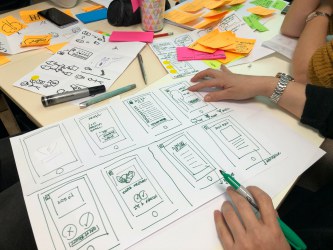For the past 2 years and a half, SISCODE has built up an extensive knowledge of co-creation processes and expertise in their practical implementation through the work of our 10 co-creation labs. In an upcoming series of workshops, which will start on Tuesday 15 December, the project partners will share their experiences.
For this first session, we will focus on a service blueprint tool.
What is a service blueprint? It is used to give an overview of the organisation’s operations such as points of interaction with the intended audience. It is useful for planning or improving a final product as it demonstrates what happens along the service line and who is doing what through what means and methods.
Join us on Tuesday 15 December from 15:00 to 17:00 CET
Taking stock of the experience gained through a journey of using co-creation to address societal needs, you will have the possibility to (re)discover and test such prototyping tools for developing new services or products.
The objectives of the workshop are to:
- Share useful resources, tools and methods developed by SISCODE for co-creation processes and more specifically for the prototyping phase
- Learn how to develop prototypes using the example service blueprints
- Exchange and discuss ideas and know-how about prototyping
This session is open to anyone interested in discovering the possibilities that prototyping offers to carry out successful co-creation processes.
AGENDA
- Welcome and introduction | 10 min
- Prototypes in co-creation activities | 20 min
- Hands-on activity to learn how to develop a service blueprint | 45 min.
- Round-table discussion | 30 min
- Walkthrough the 10 labs prototypes on Miro | 10 min
- Feedback and closure | 5 min
Seats are limited to 30 participants. Register now!
For any additional information, please contact us at olgaglumac@spi.pt and tedoraaibu@spi.pt.
The workshop will be co-facilitated and moderated by SISCODE partners: Sociedade Portuguesa de Inovação (SPI) and Ciencia Viva-Agencia Nacional para a Cultura Cientifica e Tecnologica (CV) from Portugal, Fab Lab Barcelona /Institut D’arquitectura Avancada De Catalunya (IAAC) from Spain and Thess-AHALL / Medical Physics Laboratory (AUTH) from Greece.

